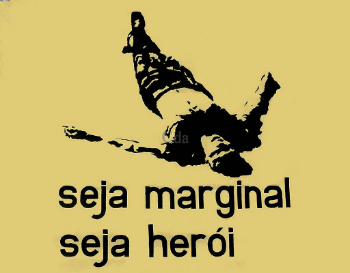THE Marginal Poetry Or the mimeograph generation it was a sociocultural movement that affected the arts (music, cinema, theater, plastic arts) above all, literature.
This movement emerged in the 70s in Brazil and directly influenced the country's cultural production.

Leminski, one of the great representatives of this generation, defines the term marginal:
“Marginal is the one who writes in the margin,
leaving the page white
for the landscape to pass
and make everything clear as you go.
Marginal, write between the lines,
never really knowing
who came first,
The egg or the chicken”.
Summary
This so-called "marginal" movement absorbed the cry silenced by the Military Dictatorship through the union of various artists, cultural agitators, educators and teachers.
Thus, it allowed a new form of dissemination of Brazilian art and culture, repressed by the totalitarian system that prevailed in the country.
Inspired by the movements of counterculture, the name “Mimeograph Generation” refers precisely to its main characteristic.
In other words, the replacement of traditional means of circulation of works by alternative means of dissemination. These were employed by independent artists or “representatives of marginal culture”.
That's how the artists involved felt the need to express themselves and, above all, spread their ideas.
From this revolutionary literary movement, the poetic production “outside the system” was disseminated by the poets themselves from small print runs.
They were produced in crude mimeographed brochures, which sold their art at low cost, in bars, squares, theaters, cinemas, universities, etc.
Marginal poetry was mostly made up of small texts, some with visual appeal (photos, comics, etc.), absorbed by a colloquial language (traits of orality), spontaneous, unconscious.
The everyday and erotic theme was permeated with sarcasm, humor, irony, profanity and slang from the periphery.
In one of the strands of this sociocultural and artistic movement, the “Marginal Poetry”, that of the periphery, appears notably, representing the voice of the minority.
The marginal poets refused any literary model, so they did not “fit” any school or literary tradition.
From this marginal movement emerged poets who stood out such as Chacal, Cacaso, Paulo Leminski and Torquato Neto.
In the musical field, Tom Zé, Jorge Mautner and Luiz Melodia stand out. In the plastic arts, it was Lygia Clark and Hélio Oiticica who identified themselves with the movement.
One of the best-known phrases by artist Hélio Oiticica demonstrates his proximity to the Mimeógrafo Generation:
“Be Marginal Be Hero”
Main Poets and Works
Check below the poets and works that stood out in the "Mimeograph Generation":
Cacaso (1944-1987)

Antônio Carlos Ferreira de Brito, known as Cacaso, was a writer, professor, critic and lyricist.
A Minas Gerais poet born in Uberaba, Cacaso was one of the greatest representatives of marginal poetry.
His voice collaborated with the cry for freedom that the country craved in the face of the repression caused by the dictatorship.
We can see this theme expressed in many of his verses, for example in the poem “Home Sweet Home”:
“My homeland is my childhood: that's why I live in exile”.
He left a great legacy for Brazilian literature, with more than 20 notebooks, some in the form of diaries, with poems, photos and illustrations.
Some works that deserve mention:
- The darned word (1967)
- school group (1974)
- Kiss on the mouth (1975)
- Second class (1975)
- On a tightrope (1978)
- Mineiro Sea (1982)
Jackal (1951)

Born in Rio de Janeiro, the name “Chacal” is the pseudonym of Ricardo de Carvalho Duarte. Alongside Cacaso, he stood out as a marginal poet in the mimeograph generation.
Brazilian poet and lyricist, Chacal mimeographed his work “Much Prazer” in 1971. Other works that deserve attention are:
- Ticket Price (1972)
- America (1975)
- Quamperius (1977)
- Red Eyes (1979)
- Purple Mouth (1979)
- Silly Things (1982)
- April Drops (1983)
- Everything Rally (1986)
- Electric Letter (1994)
- Belvedere (2007)
Paulo Leminski (1944-1989)

A poet from Curitiba and a great representative of marginal poetry, Paulo Leminski Filho was a writer, literary critic, translator and teacher.
He wrote short stories, poems, haiku, essays, biographies, children's literature, translations and, in addition, made musical partnerships.
He published his first poems in the concretist magazine “Invenções” and collaborated with other avant-garde magazines.
Some of his works that deserve mention are:
- Catatau (1976)
- Curitiba
- Etcetera (1976)
- If it weren't for that and it was less / it wasn't so much and it was almost (1980)
- Caprices and relaxations (1983)
- Jesus (1984)
- Distracted We Will Win (1987)
- Now It's They (1984)
- Metamorphosis, a journey through the Greek imagination (1994)
Francisco Alvim (1938)

A Minas Gerais poet born in Araxá, Francisco Soares Alvim Neto is a Brazilian writer and diplomat.
He stood out in marginal poetry with short poems and a colloquial language. He was part of the initial group of marginal poets “Frenesi”, alongside Cacaso and Chacal. Some works that stood out:
- Sun of the Blind (1968)
- Hobby (1974)
- Every other day (1978)
- Festival and Lake, Mountain (1981)
- Collected Poetry (1988)
- The Elephant (2000)
- The Metro None (2011)
Torquato Neto (1944-1972)

Poet from Piauí, Torquato Pereira de Araújo Neto was a writer, journalist, filmmaker (actor and director) and lyricist of popular music.
He organized the avant-garde poetry magazine “Navilouca” (1974) and participated in counterculture movements such as Tropicália, Concretism and Marginal Poetry.
In the artist's words:
“Listen, buddy: a poet is not made with verses. It's risk, it's always being in danger without fear, it's inventing danger and always recreating at least bigger difficulties, it's destroying language and exploding with it (…). Who doesn't take risks can't scream”.
His most outstanding work, arranged in two volumes, is: “Torquatália: from the inside” and “Geleia Real”, published posthumously, in 2005. At just 28, Torquato committed suicide in the city of Rio de Janeiro.
Ana Cristina César (1952-1983)

A poet, translator and literary critic from Rio de Janeiro, Ana Cristina César is considered one of the main female figures of the mimeograph generation.
His publications in independent editions that deserve mention are: “Cenas de Abril” and “Correspondência Complete”.
In addition to these, other works that stood out:
- Kid's Gloves (1980)
- Literature is not a document (1980)
- At Your Feet (1982)
- Unpublished and Scattered (1985)
Ana commits suicide in Rio de Janeiro when she was 31 years old, throwing herself from her bedroom window.
Nicolas Behr (1958)

Nicolas Behr is a Brazilian poet born in Cuiabá. He was a great representative of the Mimeograph Generation and Marginal Poetry. He released his first mimeographed work in 1977, entitled “Yoghurt with flour”.
Other works that are worth mentioning are:
- Grand Circular (1978)
- Guava kernels (1978)
- Tea with Beating (1978)
- With Mouth in the Bottle (1979)
- Brasiléia Desvairada (1979)
- L2 Noves Fora W3 (1980)
- Why I built Braxília (1993)
- Secret Secret (1996)
- Navel (2001)
Examples of Marginal Poetry
Below are some notorious examples of marginal poetry:
Fast and Creeping (Jackal)
there will be a party
that I'm going to dance
until the shoe asks to stop.
then I stop
take off my shoe
and I dance the rest of my life.
Cogito (Torquato Neto)
i am how i am
pronoun
non-transferable staff
of the man I started
as far as impossible
i am how i am
now
no big secrets before
no new secret teeth
this time
i am how i am
gift
indecent unbolted
made a piece of me
i am how i am
fortune teller
and live quietly
every hour of the end.
Sonnet (Ana Cristina César)
I ask here if I'm crazy
Who wants to know how to say
I ask more if I am sane
And even more, if it's me
that I use bias to love
and pretend to pretend i pretend
adore the pretense
pretending i'm fake
I ask here gentlemen
who is the blonde maiden
who is called Ana Cristina
And who is said to be someone
It's a major phenomenon
Or is it a subtle lapse?
Recipe (Nicolas Behr)
Ingredients:
2 generation conflicts
4 lost hopes
3 liters of boiled blood
5 erotic dreams
2 beatles songs
Way of preparing
dissolve the erotic dreams
in the two liters of boiled blood
and let your heart freeze
put the mixture on fire
adding two generational conflicts
to lost hopes
cut everything into little pieces
and repeat with the beatles songs
the same process used with dreams
erotic but this time boil a
little more and stir until dissolved
part of the blood can be replaced
for gooseberry juice
but the results will not be the same
serve the poem simple or with illusions.
Don't stop there. There are more texts very useful for you:
- Greatest modern and contemporary Brazilian poets
- must-have love poems



